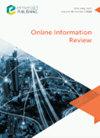“韩国的自我隔离接触者追踪应用程序:重新思考新冠肺炎时代的数据化和数据监控”
IF 3.1
3区 管理学
Q2 COMPUTER SCIENCE, INFORMATION SYSTEMS
引用次数: 0
摘要
目的:中国记录了第一例2019冠状病毒病(COVID-19)病例,该病毒很快就被引入邻国韩国。韩国是最早在个人、社会和政府层面采取相当实质性措施,发起全国性大流行应对措施的国家之一,是全球南方国家快速反应的一个有趣例子。本文分析了因海外旅行回国而被韩国政府强制进行自我隔离的人的在线/数字数据。设计/方法/方法:为了提取本研究的数据,我们收集了自我隔离的韩国人的博客文章,并采用爬行和人工检查相结合的方法进行了验证,对新冠肺炎大流行时期出现的代码和主题进行了内容分析。这种方法对于接触到受疫情影响的人特别有用。这种方法促进了作者对COVID-19接触者追踪移动应用程序的理解,以及使用这些应用程序的自我隔离者的经历。本文通过对韩国国民使用新冠病毒自我追踪应用程序的经验分析,展示了韩国国民对使用新冠病毒自我追踪应用程序的理解和看法。研究认为,该应用程序是收集自我隔离者信息并对自我隔离者进行数据监控的数据化工具。该研究进一步揭示了不同参与者(自我隔离者、其家人、原创性/价值:本研究还提供了信息和技术影响对公众进行的数据化和数据监控的影响的见解。本研究调查了正在进行的关于COVID-19接触者追踪方法涉及隐私的辩论,并建立在数据化、数据监控、社会控制和数字社会学的新兴文献基础上。本文的同行评议历史可在:https://publons / publon/101108 /OIR-08-2020-0377©2021,Emerald Publishing Limited本文章由计算机程序翻译,如有差异,请以英文原文为准。
Review for "Contact tracing apps for self-quarantine in South Korea: rethinking datafication and dataveillance in the COVID-19 age"
Purpose: The first case of coronavirus disease 2019 (COVID-19) was documented in China, and the virus was soon to be introduced to its neighboring country – South Korea South Korea, one of the earliest countries to initiate a national pandemic response to COVID-19 with fairly substantial measures at the individual, societal and governmental level, is an interesting example of a rapid response by the Global South The current study examines contact tracing mobile applications (hereafter, contact tracing apps) for those who were subject to self-quarantine through the lenses of dataveillance and datafication This paper analyzes online/digital data from those who were mandatorily self-quarantined by the Korean government largely due to returning from overseas travel Design/methodology/approach: This study uses an Internet ethnography approach to collect and analyze data To extract data for this study, self-quarantined Korean individuals' blog entries were collected and verified with a combination of crawling and manual checking Content analysis was performed with the codes and themes that emerged In the COVID-19 pandemic era, this method is particularly useful to gain access to those who are affected by the situation This approach advances the author’s understandings of COVID-19 contact tracing mobile apps and the experiences of self-quarantined people who use them Findings: The paper shows Korean citizens' understandings and views of using the COVID-19 self-tracing application in South Korea through examining their experiences The research argues that the application functions as a datafication tool that collects the self-quarantined people's information and performs dataveillance on the self-quarantined people This research further offers insights for various agreements/disagreements at different actors (i e the self-quarantined, their families, contact tracers/government officials) in the process of contact tracing for COVID-19 Originality/value: This study also provides insights into the implications of information and technology as they affect datafication and dataveillance conducted on the public This study investigates an ongoing debate of COVID-19's contact tracing method concerning privacy and builds upon an emerging body of literature on datafication, dataveillance, social control and digital sociology Peer review: The peer review history for this article is available at: https://publons com/publon/10 1108/OIR-08-2020-0377 © 2021, Emerald Publishing Limited
求助全文
通过发布文献求助,成功后即可免费获取论文全文。
去求助
来源期刊

Online Information Review
工程技术-计算机:信息系统
CiteScore
6.90
自引率
16.10%
发文量
67
审稿时长
6 months
期刊介绍:
The journal provides a multi-disciplinary forum for scholars from a range of fields, including information studies/iSchools, data studies, internet studies, media and communication studies and information systems.
Publishes research on the social, political and ethical aspects of emergent digital information practices and platforms, and welcomes submissions that draw upon critical and socio-technical perspectives in order to address these developments.
Welcomes empirical, conceptual and methodological contributions on any topics relevant to the broad field of digital information and communication, however we are particularly interested in receiving submissions that address emerging issues around the below topics.
Coverage includes (but is not limited to):
•Online communities, social networking and social media, including online political communication; crowdsourcing; positive computing and wellbeing.
•The social drivers and implications of emerging data practices, including open data; big data; data journeys and flows; and research data management.
•Digital transformations including organisations’ use of information technologies (e.g. Internet of Things and digitisation of user experience) to improve economic and social welfare, health and wellbeing, and protect the environment.
•Developments in digital scholarship and the production and use of scholarly content.
•Online and digital research methods, including their ethical aspects.
 求助内容:
求助内容: 应助结果提醒方式:
应助结果提醒方式:


